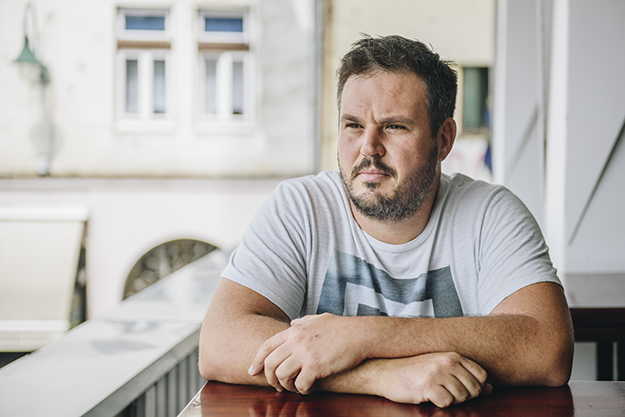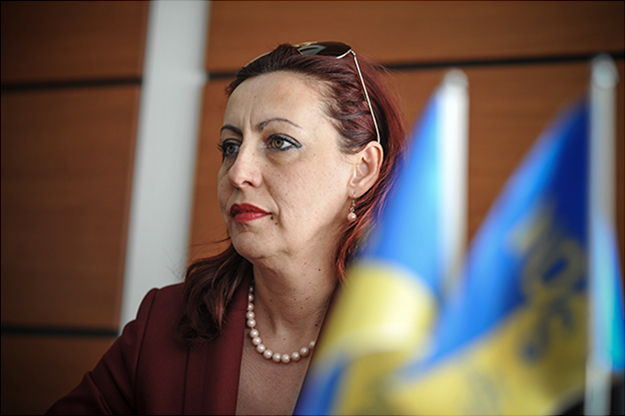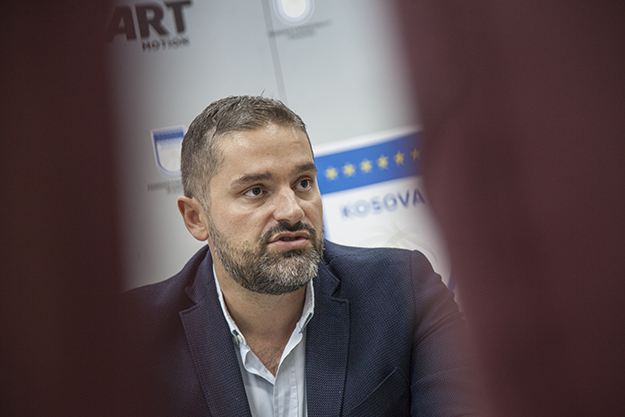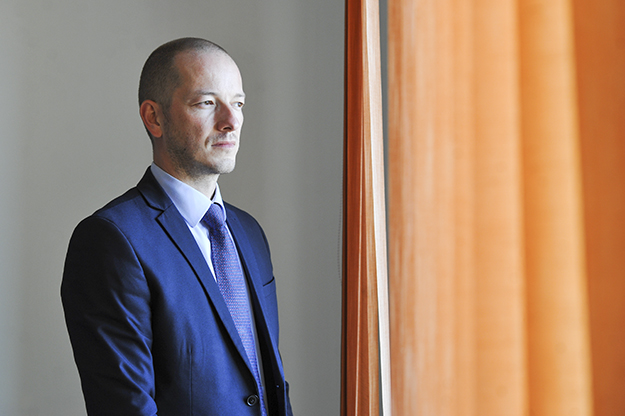Benjamin Kolenović grew up in Peja in Kosovo but was educated partly in Bosnian. “We learned from an ABC-book that taught us based on monuments that are in Bosnia: Bosnian history and geography,” Kolenović tells K2.0. “But I’ve never been able to go there,” he adds.
Earlier this year, Kolenović had an opportunity to finally see these monuments up close when he was accepted to take part in a conference in Sarajevo, but was unable to go because of visa issues. He works remotely for a Swedish digital marketing company, and had applied for another visa at the Swedish Embassy, where he had submitted his passport in accordance with the procedure.
“Since I didn’t have my passport, I was left without a Bosnian visa, so I couldn’t attend the conference,” Kolenović says laughing. In addition to this, he says that he also got a negative response from Sweden “for some reason,” although he had travelled to the country before with a visa.
The POINT conference on political accountability and new technologies that Kolenović had hoped to attend was organized by Darko Brkan, the director of Sarajevo-based NGO Zašto ne. The organization often holds regional and international conferences, so Brkan is familiar with visa issues, often having to cancel or postpone events because of such barriers.
“The only countries that have visa problems are Kosovo and the Middle Eastern countries, but no other countries in the region or Europe face such issues,” he tells K2.0.

Zašto ne director Darko Brkan has had to cancel events due to barriers created by the visa regime between Kosovo and Bosnia and Herzegovina, and believes it’s almost impossible to receive a visa to travel between the two states. Photo: Imrana Kapetanović / K2.0.
According to Brkan, another issue that makes traveling more complicated is the fact that Bosnian authorities hardly give visas for individual travelers for family-related reasons. “To travel between Kosovo and Bosnia, you need to have a reason that is related to some international event or that benefits one of the states. It is just about impossible to get a visa,” Brkan says.
Zašto ne’s director believes that when it comes to considering options for solving these issues between the two countries, the solution must be sought in Belgrade, rather than in Sarajevo, due to its strong influence on the leadership of Bosnia and Herzegovina’s Serb majority Republika Srbska entity. He highlights the fact that political decision-making in BiH is divided, and that this is the case for its issues with Kosovo as well. “In general, relations between Kosovo and Bosnia depend mostly or completely on relations between Kosovo and Serbia,” Brkan concludes.
It is a position echoed by Emilija Redžepi, a Bosniak deputy in the Kosovo Assembly with the New Democratic Party, which is part of the Alliance for the Future of Kosovo (AAK) parliamentary group. Redžepi believes that the international community must pressure Belgrade more, so that Belgrade can in turn influence Banja Luka — the de facto capital of the entity of Republika Srpska in BiH — so that issues with travel documents are regulated and relations improved.
Explaining these issues in conversation with K2.0, Redžepi says that visas are causing many issues in the lives of citizens who cannot travel or study where they want due to these blockades. “Bosniak students cannot study in their motherland,” Redžepi says.

Kosovar Bosniak deputy in the Kosovo Assembly Emilija Redžepi believes that the state of connection between the two countries is tragic in an era where relations between European states are typically so open. Photo: Atdhe Mulla / K2.0.
According to the deputy, the visa regime is also keeping families segregated in the two countries. She illustrates the point with a case involving a Kosovar citizen that happened earlier this month after a fatal traffic accident in Bosnia. “One man could not attend his brother’s funeral because of complicated visa procedures, because you need to apply in a neighboring country and the process takes weeks to conclude,” Redžepi says. “What is happening now is tragic, at a time when Europe’s borders are open.”
She also highlights the lack of inter-institutional cooperation between the two states as “very weak, even weaker than with Serbia,” adding that the Kosovo government has not done enough and holds part of the blame for the blockade in its relations with BiH. “Kosovo’s Foreign Ministry and Government have never invited legitimate Bosnian representatives to engage and partake in solving this issue,” she says.
Indeed, the visa regime works both ways, after Kosovo imposed reciprocal measures toward BiH in January 2014, when the subject of travel between the two states was a hot topic in the media.
Despite the dying down of media attention in recent years, citizens have still faced issues. Earlier this month, the Kosovo basketball federation invited a guest who was a citizen of BiH to Kosovo’s international match with Macedonia. He had to apply for a visa at the Kosovo Embassy in Istanbul, causing delays and excess expenses.
Sportspeople in the region have often been disrupted by travel issues. In May this year, Serbia’s Internal Ministry gave an order to prohibit representatives of Kosovo’s national karate team from entering the country. The Serbian government’s so-called Office for Kosovo and Metohija released a statement in which it confirmed that the Kosovar team had been sent back twice at the Merdare border crossing, prohibiting it from taking part in the event being held in Novi Sad.
Three months later, in August, the Kosovo U16 national basketball team faced issues in their attempts to travel to Sarajevo for the European Basketball Championship. Bosnian authorities did not provide visas for the young athletes in time, thereby jeopardizing their participation in the championship.

Head of the Kosovo Basketball Federation, Arben Fetahu, believes that the difficulties Kosovo’s under-16 team had in travelling to the European Championships in Sarajevo was a clear case of politics interfering in sport. Photo: Majlinda Hoxha / K2.0.
The head of the board at the Kosovo Basketball Federation, Arben Fetahu, explains the stressful process that the federation and the young team went through while trying to get the green light to travel to Sarajevo, saying that the federation applies for visas for every event, but has never faced such issues like it did with BiH, not even in other countries that have not recognized Kosovo’s independence.
“When we ran out of time, four to five days before we were due to travel, we wrote to FIBA [the International Basketball Federation] and told them that we do not have visas,” Fetahu tells K2.0. “After they applied pressure, Bosnia told us that we could pick up our visas on Monday.”
However, according to Fetahu, the visas were still not handed over immediately at the embassy in Skopje, because Bosnia’s Foreign Ministry refused to sign the confirmation for the Kosovar team’s visas.
The delays left the team with a hectic schedule. “Two of our matches were postponed. We arrived there on the third day, 7-8 hours before the match, and we played every day without resting. The two matches that we missed we compensated in days that were originally scheduled as off days,” the federation boss explains. “We understand political implications, but the children don’t. They prepared for 8 weeks to compete and it is hard for them to understand the issues with Republika Srpska.”
Fetahu feels that it was a clear case of politics interfering with sport. “We have great relations with our counterparts in the Bosnian federation. We have friends who are members of their board, people who have done their utmost to help us, but on the other hand there were [Bosnian] Serb representatives who influenced this situation.”
Unconnected infrastructure
While visa regimes are still causing issues for Kosovar and Bosnian citizens, one of the biggest obstacles to free movement for all citizens of the region is the lack of proper transport infrastructure connecting the states. Investments in more efficient networking and shortening of travel times between countries have been insufficient.
Donika Emini, a researcher at the Kosovar Center for Security Studies, highlights the difficulties of travel between Balkan states. “When we organized activities in Bosnia, I had to fly Prishtina to Frankfurt to Ljubljana to Sarajevo,” she tells K2.0.
A journey by car from Prishtina to Sarajevo would involve having to go via Montenegro due to restrictions over Kosovo IDs at the Serbian-Bosnian border, and takes up to 12 hours as the route is through old mountain roads. With the exception of Prishtina and Tirana, none of the capitals of Montenegro, Bosnia and Herzegovina, Serbia, Kosovo, Macedonia and Albania are connected by a highway, with long journeys required between all of them.
The European Union’s connectivity agenda aims to improve transport and energy connections both within the Western Balkans and between the region and the EU. At a meeting held in Brussels on April 21, 2015, the prime ministers of Kosovo, Macedonia, Albania, Montenegro, Serbia, and Bosnia and Herzegovina jointly signed a statement that foresaw the priority of infrastructure projects that would strengthen ties between the countries.
However, projects have often fallen behind schedule through a mix of absence of financing, exploitative contractors and a lack of political will.

Democracy For Development’s Shpend Emini estimates that only around half of the infrastructure projects promised to be prioritized in the EU connectivity agenda have started concrete work in 2018. Photo: Atdhe Mulla / K2.0.
The agreement included 11 projects related to road construction and eight extending the rail network in the region. But Shpend Emini, a researcher and director of Democracy For Development in Prishtina, says that the development of projects agreed with the EU has gone slower than initially planned. According to him, only half of the projects listed on the agreed connectivity agenda have started concrete work in 2018.
There have undoubtedly been problems with ‘Corridor X,’ a project aimed at connecting the region with central Europe and ports in Greece. The road has been planned since the early 21st century and has missed numerous deadlines, with the closing date being pushed back three times, from the original date of December 2015 all the way back to June next year.
Major delays have been caused by extensions in Serbia. The World Bank has contributed just over 275 million euros to the loan that is financing construction of the road. The organization’s manager within Serbia, Tony Verheijen, has blamed contractors for manipulating the Serbian government.
“Serbia is regularly taken for a ride by contractors,” Verheijen told World Highways in 2017. “The behavior of some firms that are awarded contracts on large international tenders is plainly awful. They win contracts by underbidding on price, then recuperate through claims processes, they take eight months to mobilise and whenever challenged by the government or financiers, they mobilise their own governments to put pressure on the Serbian one, so that no action is taken.”


